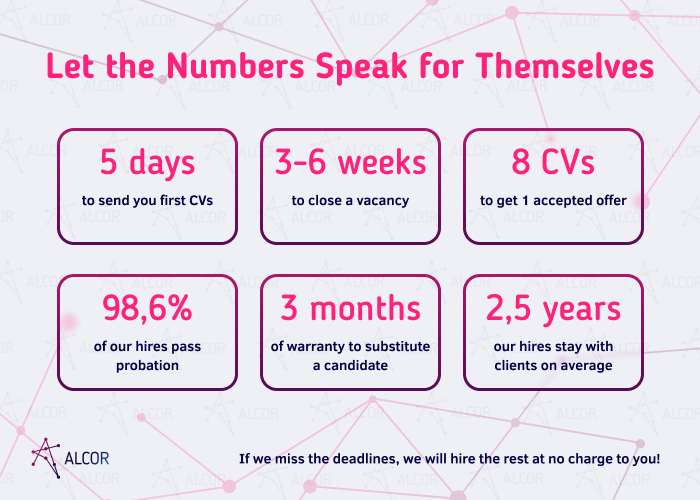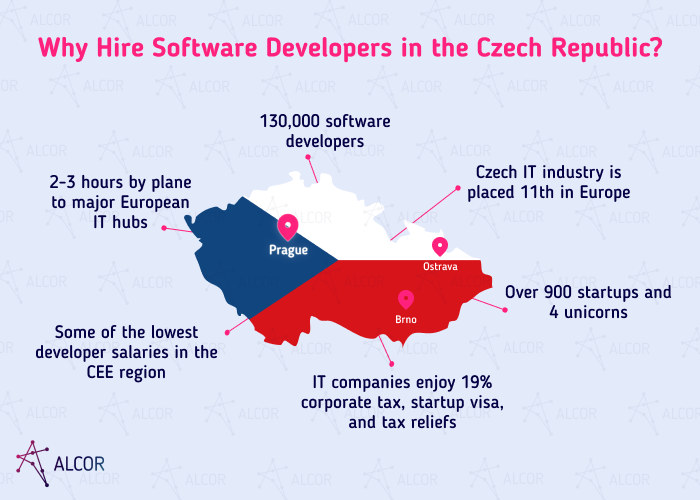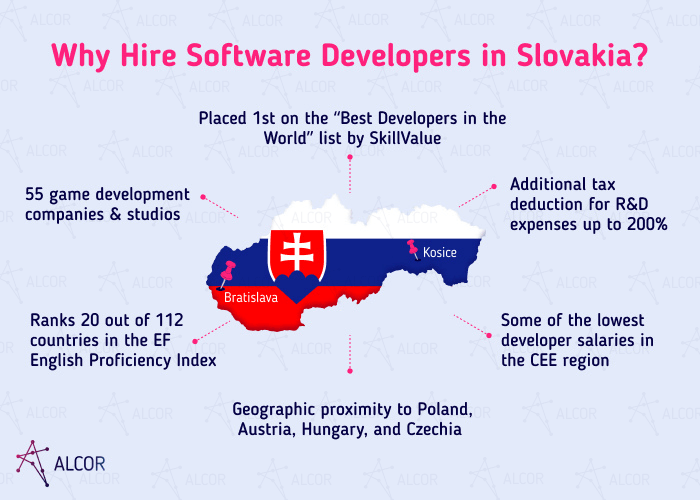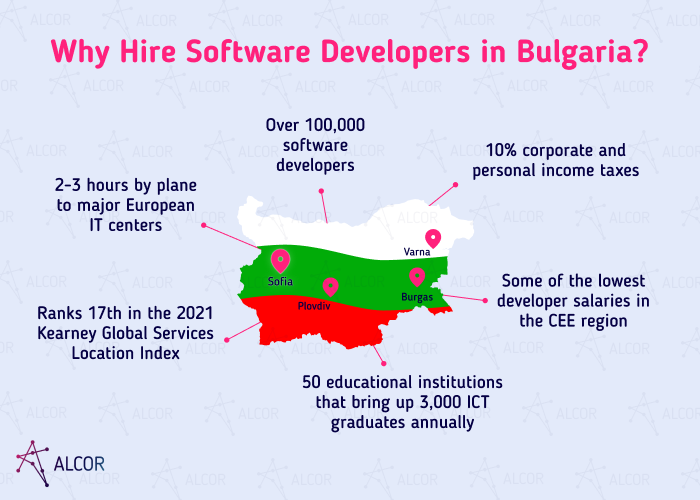According to a McKinsey survey, about 87% of tech executives see the talent gap as their main challenge in keeping up with a fast-paced market reality. Moreover, burning competition for skilled developers and rising labor costs only add fuel to the fire. Therefore, the majority of western tech companies consider cost-effective alternatives of getting a qualified IT workforce, and one of them is Eastern Europe. But is it worth outsourcing to this region?
In this article, I am going to give you key insights on the Eastern European IT market, its talent pool, average developer rates and taxes, and cover in detail some of its principal IT hubs.

3 Latest Worldwide Trends in IT Outsourcing
1. India is losing its ground as a leading IT outsourcing destination
For over a decade India was considered one of the top IT outsourcing destinations. While some countries were making first steps in their long outsourcing journey, India was already capable of providing foreign tech companies with a large and cheap IT workforce. But as we know, low price often comes with its own cost, and in the case with India it’s the quality of code.
So, what are the prerequisites of that? Firstly, it’s ineffective college education. According to the National Employability Report for Engineers, only 60% of Indian developers are capable of producing clear code, while just 3% possess new-age tech skills. Secondly, it’s attitude towards work. Since most Indian programmers are paid low wages and are forced to undertake several projects at a time, it’s not uncommon among them to show inadequate motivation, dedication, and accountability. As a result, they tend to perform mediocre work (if not resorting to plagiarism). Another aspect is cultural mentality which often becomes a stumbling block to effective cooperation between American tech companies and Indian developers.
Since today’s IT outsourcing goes well beyond mere cost reduction, India falters in comparison to destinations with a much better price-to-quality ratio, such as Eastern European countries, for example.
2. China’s IT outsourcing pitfalls scare away more and more companies
Known for its enormous tech talent pool, China has been luring foreign IT companies to leverage the benefits of software outsourcing by getting diverse expertise and technology. However, with a rapid expansion of the outsourcing market and appearance of a variety of outsourcing alternatives, the drawbacks of IT development delegation to China became more vivid.
The first aspect is copyright issues. As it is known, Intellectual Property Rights (IPR) protection is of great importance when it comes to outsourcing. Since vendors get access to sensitive data, they could put the exclusivity of the client’s end-product at risk. Not all service providers in China comply with international IPR rules which sometimes results in data breaching. The same thing refers to quality control, since Chinese standards are quite different from the ones exercised in the USA and Europe.
Another issue is language barrier. According to the EF English Proficiency Index, China is ranked 62nd out of 111 countries. This means that efficient communication is quite hard to achieve when working with Chinese programmers which increases the chances of getting a poor-quality software product. One more aspect that makes IT outsourcing to China problematic is the tremendous time difference with the Western World. For instance, American tech companies are on average 13-15 hours behind the Chinese vendors which inevitably decreases their productivity.
3. BPO services are gaining popularity
Facing the consequences of the coronavirus pandemic and mounting IT talent shortage, technology companies have been scaling their businesses by taking advantage of near- and far-shore markets. While some firms still stick to traditional IT outsourcing, others make their choice in favor of a more beneficial solution — their own engineering team backed with Business Process Outsourcing (BPO) services. This approach enables tech companies to get greater operational flexibility and cost reduction while retaining their focus on core tasks. Moreover, this business model allows IT companies to bypass the risks associated with outsourcing. The scope of IT BPO services is quite broad, starting from tech recruitment and HR management to accounting, legal compliance, and even procurement management.
Is it Beneficial to Outsource Eastern European Developers? How much?
As I mentioned above, Eastern Europe is slowly but steadily overtaking the old IT outsourcing leaders with its balanced price-to-quality ratio. This region remains cheaper labor-wise than Western European countries, while providing much higher quality services than Asian outsourcing destinations.
From the table below you can see that the annual programmer wages in popular Eastern European tech hubs are about 2-3 times lower than the US ones. For instance, American Data Engineers usually charge $150,000 a year, while their Hungarian colleagues take $40,000 for the same job. That’s about 70% of saved labor costs, can you imagine? In addition to that, by outsourcing Eastern European developers you won’t have to worry about costly social contributions and taxes. These programmers can be employed on B2B terms and take care of taxes themselves. For example, Polish software engineers acting as independent contractors pay a lump sum tax of only 8,5-12%, while the amount of social contributions ranges from $900 to $2,600 per annum, depending on annual revenue.
|
Annual Salary Comparison |
|||||||||||
| Positions | |||||||||||
| USA | Poland | Romania | Hungary | Czechia | Bulgaria | Slovakia | |||||
| Full-Stack Software Developer |
$130,000 | $52,000 | $50,000 | $43,000 | $46,000 | $48,000 | $45,000 | ||||
| Front-End Software Developer |
$110,000 | $44,000 | $42,000 | $30,000 | $38,000 | $40,000 | $42,000 | ||||
| Back-End Software Developer |
$120,000 | $48,000 | $45,000 | $32,000 | $43,000 | $45,000 | $45,000 | ||||
| DevOps developer |
$135,000 | $56,000 | $53,000 | $38,000 | $54,000 | $42,000 | $50,000 | ||||
| Data Engineer |
$150,000 | $70,000 | $65,000 | $40,000 | $60,000 | $43,000 | $52,000 | ||||
| Software Development Engineer in Test |
$90,000 | $36,000 | $34,000 | $27,000 | $34,000 | $33,000 | $37,000 | ||||
However, this cost-effectiveness can only be achieved by assembling your own team of Eastern European software developers, as partnership with outsourcing vendors often results in additional expenses due to cloudy pricing and other disadvantages.
Read this article to get an in depth idea on IT engagement models.
Is it Safe to Outsource Software Development to Eastern Europe?
Apart from lack of financial transparency, outsourcing to software companies in Eastern Europe is not devoid of risks associated with data security. With mounting labor shortages among developers, IT outsourcing gained more prominence, and along with it source code leaks increased by 66%. The specific risks of software outsourcing usually include code data, personal information, and credentials leaks. One of the increasing areas of concern is breaches caused by shadow leaks. It involves a valid, but unused or unauthorized, employee account used to freely access the client’s sensitive data even after project fulfillment. The incidents of shadow leaks rose by 40% between 2020 and 2021, making it a critical issue.
As it is known, software products are the most prized possession of IT companies, as they encompass everything from technologies and expertise to intellectual property and trade secrets. Therefore, outsourcing your software development in Eastern Europe to third-party vendors can be of great risk since your precious asset may find itself in the hands of people who don’t feel guilt for using your intellectual property (as a ready-made draft for executing other IT projects).
Of course, every service provider is different, and there are firms that follow GDPR and various security standards, such as ISO/IEC 27001, GLBA, NIST SP 800-53, etc. It’s also possible to sign a non-disclosure agreement when· programming outsourcing to Eastern Europe. But why put your sensitive data at risk if you can stay on the safe side by setting up your own team of developers? There is a Build-Operate-Transfer model in the IT industry that presupposes the full coverage of back-office operations (like IT recruitment, accounting, and legal compliance), allowing foreign product companies to focus on software engineering. Your offshore team of programmers can bring you peace of mind as your IP rights, as well as product elaboration and expenses, will remain under your control.
2 Major Insights About the Eastern European IT Market
The Eastern European IT industry has been growing in leaps and bounds, transforming into a mature market that can compete with global heavy-weights. Its revenue is projected to show an annual growth rate (CAGR 2023-2027) of 7.84%, resulting in a market volume of $15.70bn by 2027. There are 2 key aspects that contribute to its vibrant development.
1. Business-friendly Environment
Eastern European governments pay special attention to the enhancement of their IT infrastructure and business climate. Such destinations as Estonia, Poland, and Bulgaria are included in the top 20 countries of the 2021 Kearney Global Services Location Index (with high financial attractiveness and business environment). Meanwhile, Ease of Doing Business 2020 identifies most EE countries as beneficial locations for investment and starting a business. Some of the main advantages of outsourcing in Eastern Europe are tax incentives. For instance, the Czech Republic has a pretty low corporate tax of 19% and offers a startup visa for foreigners, while in Poland, those businesses that generate income from their IP rights would pay only 5% tax.
2. Expanding Talent Pool
Today, there are over 1 million IT professionals in Eastern Europe. This talent pool broadens year by year, as 300 higher educational institutions bring up tens of thousands of STEM specialists. The table below demonstrates that the biggest number of such graduates can be found in Poland (15,000), which is the reason why this offshoring destination has the largest talent pool in EE. This is more than enough to satisfy the internal market needs. However, it’s not the case with the USA. 400,000 IT graduates can’t eliminate the software engineer shortfall which is expected to increase to over 1,2 million by 2026. That’s why more and more American tech businesses seek alternative ways of recruiting skilled programmers, thus software development outsourcing to Eastern Europe is often their best bet.
| Country | Population | Talent pool | Tech graduates per year | Number of IT jobs in 2022 |
| USA | 335 million | 4,4 million | 400,000 | 4 million |
|
Poland |
38 million | 430,000 | 15,000 | 25,000 |
|
Romania |
19 million | 143,000 | 7,000 | 10,000 |
|
Czech Republic |
10,5 million | 130,000 | 5,000 | 7,000 |
|
Bulgaria |
6,8 million | 110,000 | 3,000 | 4,000 |
|
Hungary |
9,5 million | 105,000 | 4,000 | 8,000 |
Top 7 IT Outsourcing Destinations in Eastern Europe
Poland
Demonstrating a stable year-on-year growth in the ICT sector, Poland has become a go-to option among international tech companies, when it comes to IT outsourcing to Eastern Europe. With a revenue of $10,4 billion and exports of $8,6 billion, the Polish IT industry ranks 7th in Europe. According to the 2021 Kearney Global Services Location Index, Poland is ranked 14th, having an advanced business environment and financial attractiveness.
There are more than 50 thousand technology companies that operate in Poland including 3,000 startups (10 unicorns), and 1,400 businesses providing BPO, SSC/GBS, and R&D services. Such progress is driven by its extensive talent pool of over 430,000 IT experts. Polish programmers are skilled in a wide range of modern technologies like JavaScript, Java, Python, and C#, to name just a few. Their high qualification is proven by Harvard Business Review, SkillValue, and HackerRank Best Developers ranking, where Polish developers are in the top 5 list. When foreign tech companies opt for IT outsourcing to Poland, they can choose from such ripe hubs as Warsaw, Krakow, Wroclaw, Tri-City, Poznan, and Lodz.

Romania
Despite the fact that Romania has quite a young ICT industry, it’s developing at an unprecedented pace, ranking 12th in Europe. Romania boasts the third largest tech talent pool among Eastern European market leaders – 143,000, which broadens with 7,000 new ICT professionals each year. They are not only well-versed in popular technologies, such as Java, C#, JavaScript, Python, and PHP, but also have a high English proficiency level (placed 17th in the world). The biggest concentration of software engineers as well as tech companies is in Bucharest, Cluj-Napoca, and Iasi. Today, these tech centers are home to more than 1,500 startups, scale-ups, R&Ds, and VCs.
The main drivers of such an active IT business environment are generous incentives & perks, including 0% income tax for programmers and R&D employees and 0% income tax for R&D companies for 10 years. No wonder why such tech giants as Microsoft, Google, Amazon, Oracle, and Samsung have already opted for IT outsourcing to Romania.

Czech Republic
Among major IT outsourcing destinations of Eastern Europe is the Czech Republic. Their local software industry is ranked 11th in Europe, seeing an average of 4% annual growth rate annually. There are 3 major IT centers, Prague, Brno, and Ostrava, that host over 130,000 programmers (one of the biggest talent pools in Eastern and Central Europe). The numbers of their IT labor force are constantly increasing with 5,000 students graduating from 25 public and 40 private STEM universities. Czech tech experts are known for being well-versed in a variety of technologies, especially Python, Java, C#, JavaScript, Swift, HTML, and CSS. When it comes to specialization, they have the best performance at computer networking, databases development, and software engineering.
The entrepreneurial ecosystem in Czechia is not lagging from other Eastern European IT outsourcing destinations. The country has over 900 startups and 4 unicorns. To minimize the taxation pressure (19% corporate tax), Czechia offers cash support, grants, and tax reliefs as well as a start-up visa that make IT offshoring to this destination particularly appealing to foreign tech businesses. That’s why tech giants like Microsoft, Google, Oracle, and IBM have their R&D centers in the county.

Hungary
Another popular Eastern European location among western IT companies is Hungary. Being an EU member-state, the country is allocating substantial funds into the development of its ICT sector, which currently has a value of $20 billion. Hungary has over 105,000 tech talent pool that expands year on year with 4,000 graduates that gain deep professional knowledge in 70 STEM universities. These programmers are well-crafted in JavaScript, C++, and Python, while their main specializations are computer networking, databases development, computer science, and web development, according to the Global Skills Report 2021. Hungarian developers are dispersed over 3 IT hubs, namely Budapest, Debrecen and Miscolc.

Slovakia
The hidden gem of the EE region is definitely Slovakia. This offshoring destination has a pool of more than 53,000 IT experts which enlarges by 3,000 tech graduates annually. These developers are skilled in a variety of coding languages, and if you need Python specialists, Slovak programmers are the best choice according to the SkillValue report. Moreover, these coders have a good command of English as well as German, French, and even Spanish. So, effective communication is fairly guaranteed. The majority of tech professionals live in Bratislava and Kosice — the ripest IT hubs in the country.
Slovakia offers quite a few tax incentives, including an income tax rate of 21% and additional 200% R&D expenses deduction from the tax base. This aspect makes Slovakia an attractive offshoring place for doing business, as it has already been chosen by such well-known tech companies as IBM, Lenovo, Dell, and many others.

Bulgaria
More and more western tech companies opt for Bulgaria — a rapidly growing IT market in Southeastern Europe. The turnover of its ICT services industry has increased by 779.1 million euros since 2019 due to the government’s massive investment into digital transformation. It served as a driving force for the Bulgarian outsourcing industry to expand at a CAGR of 15.6%, now accounting for 5.5% of the country’s GDP. Bulgaria’s skyrocketing innovation development is largely influenced by its IT workforce which currently consists of around 110,000 tech specialists, 28% of which are female. Thanks to a well-developed educational system, Bulgarian developers possess deep technical competence proven by reputable rankings. Most of these programmers can be found in Sofia, Burgas, and Plovdiv.
When it comes to doing business, this offshoring location offers generous tax incentives — 10% of the corporate and personal income taxes, which is the lowest indicator among EU countries. This fact allows more foreign IT companies, such as Hewlett Packard, CISCO, Oracle, IBM, and SAP to enter the market and boost their growth.

Estonia
A true ICT success story in the CEE and Baltic region is undoubtedly Estonia. Starting from the year 2003, the country’s government has been directing its actions towards digital transformation which resulted in Estonia being ranked 18th in the Global Innovation Index. The Estonian IT industry contributes 7% to the national GDP and is expected to become a leading economic sector.
Knowing the problem of having a small population (and therefore insufficient number of IT professionals — 52,000), Estonia relied on the development of a favorable business climate to attract more talent and foreign investment. Now it’s a remarkable entrepreneurial location which is placed 13th in the Startup Ecosystem Report with more than 1 startup company per 1,000 people. In total, there are 1,440 startups and 7 unicorns, including such outstanding ones as Skype, Bolt, Wise, and Pipedrive.
Two major tech hubs are making the biggest contribution to the Estonian IT industry — Tallinn and Tartu. They also host the largest share of the local IT workforce. Despite its modest size, Estonian developers are highly well-versed specialists. No wonder why this country is included in the top 20 list of the Global Talent Competitiveness Index 2022.

Among other Eastern European offshoring locations are Lithuania, Latvia, Moldova, and Croatia.
Software Development Outsourcing to Eastern Europe Can be Easier with Alcor
As you can see, Eastern Europe is a large offshoring region with multiple unique IT hubs. To make a good pick when going offshore, I recommend partnering with a professional IT recruitment company like Alcor. Being in the market for over 10 years, we know the specifics of each Eastern European destination. We’ve guided numerous western tech companies through the offshoring process, including People.ai, Sift, Grammarly, ThredUp, and Dotmatics.
Let’s have a closer look at one of our success cases — Sift. This US-based IT company was seeking ways to expand their development team with Eastern European developers. To make their expansion successful, they reached out to a local expert — Alcor. Not only did we help Sift to choose the most suitable offshoring destination, but also assembled their own remote team of 30 skilled engineers within just a year! Our IT recruiters covered all staffing stages, including vacancies adjustment, catchy EVP creation, and candidate pre-screening, etc. To boost the hiring process, our marketing team conducted a powerful employer branding campaign, while our account managers covered arising legal matters.
Alcor’s 40+ IT recruiters make the most out of our 600,000-person talent network, providing clients with candidates that possess proven track records and a perfect cultural match. That’s why 4 out of 5 developers that we introduce to our clients are considered good and invited for an interview, while 98,6% of all candidates successfully pass the probation period!
FAQ
???? 1. How beneficial are the Eastern European outsourcing destinations?
By getting an engineering team in Eastern Europe, American IT companies can significantly reduce their labor costs. The average developer salary in this region is about 2-3 times lower than in the USA. Read this article to learn more.
???? 2. Is it safe to outsource software development to Eastern Europe?
Most Eastern European destinations are EU member states, meaning they comply with GDPR as well as international security standards like ISO/IEC 27001. However, it’s not uncommon among IT outsourcing vendors to breach IP rights. Thus, building your own tech team is a more secure and reliable option.
???? 3. How big is the Eastern European talent pool?
Eastern Europe is home to 1 million IT professionals, with Poland, Ukraine, and Romania boasting the largest talent pools.
???? 4. What are the top offshoring locations in the EE region?
There are at least 7 solid Eastern European offshoring destinations that foreign IT companies can choose from, including Poland, Romania, Bulgaria, and Czech Republic, etc.
???? 5. What is the best way to hire Eastern European developers for IT companies?
If you are a product tech company seeking an effective and safe way to scale up abroad, you should consider partnering with a professional IT recruitment company. By getting a dedicated engineering team, you’ll retain full control over your software development and expenses, have direct communication with developers, and protect your IP rights.
